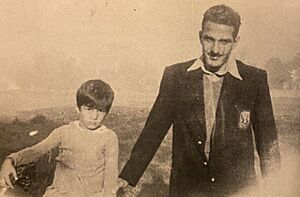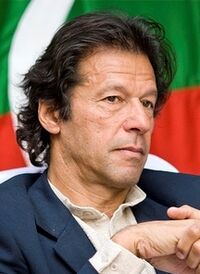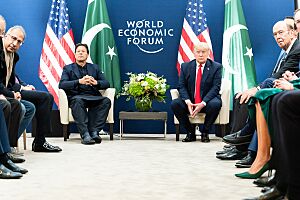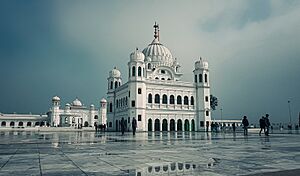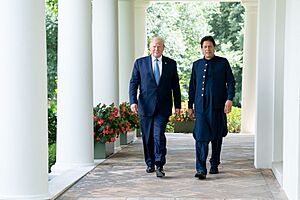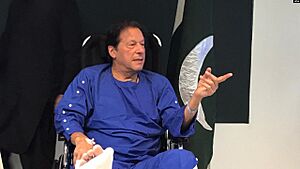Imran Khan facts for kids
Quick facts for kids
Imran Khan
HI(C) PP FRCPE
|
|||||||||||||||||||||||||||||||||||||||||||||||||||||||||||||||||||||||||||||||||||||||||||||||||||||||||||||||||||
|---|---|---|---|---|---|---|---|---|---|---|---|---|---|---|---|---|---|---|---|---|---|---|---|---|---|---|---|---|---|---|---|---|---|---|---|---|---|---|---|---|---|---|---|---|---|---|---|---|---|---|---|---|---|---|---|---|---|---|---|---|---|---|---|---|---|---|---|---|---|---|---|---|---|---|---|---|---|---|---|---|---|---|---|---|---|---|---|---|---|---|---|---|---|---|---|---|---|---|---|---|---|---|---|---|---|---|---|---|---|---|---|---|---|---|---|
| عمران خان | |||||||||||||||||||||||||||||||||||||||||||||||||||||||||||||||||||||||||||||||||||||||||||||||||||||||||||||||||||
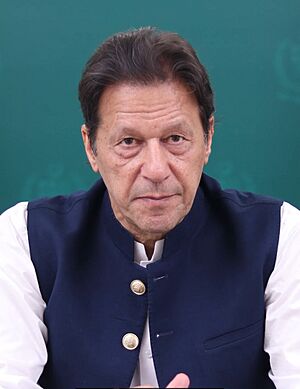
Khan in 2021
|
|||||||||||||||||||||||||||||||||||||||||||||||||||||||||||||||||||||||||||||||||||||||||||||||||||||||||||||||||||
| 19th Prime Minister of Pakistan | |||||||||||||||||||||||||||||||||||||||||||||||||||||||||||||||||||||||||||||||||||||||||||||||||||||||||||||||||||
| In office 18 August 2018 – 10 April 2022 |
|||||||||||||||||||||||||||||||||||||||||||||||||||||||||||||||||||||||||||||||||||||||||||||||||||||||||||||||||||
| President | |||||||||||||||||||||||||||||||||||||||||||||||||||||||||||||||||||||||||||||||||||||||||||||||||||||||||||||||||||
| Preceded by | Nasirul Mulk (caretaker) | ||||||||||||||||||||||||||||||||||||||||||||||||||||||||||||||||||||||||||||||||||||||||||||||||||||||||||||||||||
| Succeeded by | Shehbaz Sharif | ||||||||||||||||||||||||||||||||||||||||||||||||||||||||||||||||||||||||||||||||||||||||||||||||||||||||||||||||||
| Chairman of the Pakistan Tehreek-e-Insaf | |||||||||||||||||||||||||||||||||||||||||||||||||||||||||||||||||||||||||||||||||||||||||||||||||||||||||||||||||||
| In office 25 April 1996 – 2 December 2023 |
|||||||||||||||||||||||||||||||||||||||||||||||||||||||||||||||||||||||||||||||||||||||||||||||||||||||||||||||||||
| Vice-Chairman | Shah Mahmood Qureshi | ||||||||||||||||||||||||||||||||||||||||||||||||||||||||||||||||||||||||||||||||||||||||||||||||||||||||||||||||||
| Preceded by | Position established | ||||||||||||||||||||||||||||||||||||||||||||||||||||||||||||||||||||||||||||||||||||||||||||||||||||||||||||||||||
| Succeeded by | Gohar Ali Khan | ||||||||||||||||||||||||||||||||||||||||||||||||||||||||||||||||||||||||||||||||||||||||||||||||||||||||||||||||||
| Member of the National Assembly | |||||||||||||||||||||||||||||||||||||||||||||||||||||||||||||||||||||||||||||||||||||||||||||||||||||||||||||||||||
| In office 13 August 2018 – 21 October 2022 |
|||||||||||||||||||||||||||||||||||||||||||||||||||||||||||||||||||||||||||||||||||||||||||||||||||||||||||||||||||
| Preceded by | Obaidullah Shadikhel | ||||||||||||||||||||||||||||||||||||||||||||||||||||||||||||||||||||||||||||||||||||||||||||||||||||||||||||||||||
| Constituency | NA-95 Mianwali-I | ||||||||||||||||||||||||||||||||||||||||||||||||||||||||||||||||||||||||||||||||||||||||||||||||||||||||||||||||||
| Majority | 113,523 (44.89%) | ||||||||||||||||||||||||||||||||||||||||||||||||||||||||||||||||||||||||||||||||||||||||||||||||||||||||||||||||||
| In office 19 June 2013 – 31 May 2018 |
|||||||||||||||||||||||||||||||||||||||||||||||||||||||||||||||||||||||||||||||||||||||||||||||||||||||||||||||||||
| Preceded by | Hanif Abbasi | ||||||||||||||||||||||||||||||||||||||||||||||||||||||||||||||||||||||||||||||||||||||||||||||||||||||||||||||||||
| Succeeded by | Sheikh Rashid Shafique | ||||||||||||||||||||||||||||||||||||||||||||||||||||||||||||||||||||||||||||||||||||||||||||||||||||||||||||||||||
| Constituency | NA-56 Rawalpindi-VII | ||||||||||||||||||||||||||||||||||||||||||||||||||||||||||||||||||||||||||||||||||||||||||||||||||||||||||||||||||
| Majority | 13,268 (8.28%) | ||||||||||||||||||||||||||||||||||||||||||||||||||||||||||||||||||||||||||||||||||||||||||||||||||||||||||||||||||
| In office 10 October 2002 – 3 November 2007 |
|||||||||||||||||||||||||||||||||||||||||||||||||||||||||||||||||||||||||||||||||||||||||||||||||||||||||||||||||||
| Preceded by | Constituency established | ||||||||||||||||||||||||||||||||||||||||||||||||||||||||||||||||||||||||||||||||||||||||||||||||||||||||||||||||||
| Succeeded by | Nawabzada Malik Amad Khan | ||||||||||||||||||||||||||||||||||||||||||||||||||||||||||||||||||||||||||||||||||||||||||||||||||||||||||||||||||
| Constituency | NA-71 Mianwali-I | ||||||||||||||||||||||||||||||||||||||||||||||||||||||||||||||||||||||||||||||||||||||||||||||||||||||||||||||||||
| Majority | 6,204 (4.49%) | ||||||||||||||||||||||||||||||||||||||||||||||||||||||||||||||||||||||||||||||||||||||||||||||||||||||||||||||||||
| Chancellor of the University of Bradford | |||||||||||||||||||||||||||||||||||||||||||||||||||||||||||||||||||||||||||||||||||||||||||||||||||||||||||||||||||
| In office 7 December 2005 – 8 December 2014 |
|||||||||||||||||||||||||||||||||||||||||||||||||||||||||||||||||||||||||||||||||||||||||||||||||||||||||||||||||||
| Preceded by | Betty Lockwood | ||||||||||||||||||||||||||||||||||||||||||||||||||||||||||||||||||||||||||||||||||||||||||||||||||||||||||||||||||
| Succeeded by | Kate Swann | ||||||||||||||||||||||||||||||||||||||||||||||||||||||||||||||||||||||||||||||||||||||||||||||||||||||||||||||||||
| Personal details | |||||||||||||||||||||||||||||||||||||||||||||||||||||||||||||||||||||||||||||||||||||||||||||||||||||||||||||||||||
| Born |
Imran Ahmad Khan Niazi
5 October 1952 Lahore, West Punjab, Pakistan |
||||||||||||||||||||||||||||||||||||||||||||||||||||||||||||||||||||||||||||||||||||||||||||||||||||||||||||||||||
| Political party | Pakistan Tehreek-e-Insaf (since 1996) | ||||||||||||||||||||||||||||||||||||||||||||||||||||||||||||||||||||||||||||||||||||||||||||||||||||||||||||||||||
| Spouses |
Bushra Bibi
(m. 2018) |
||||||||||||||||||||||||||||||||||||||||||||||||||||||||||||||||||||||||||||||||||||||||||||||||||||||||||||||||||
| Children | 2 | ||||||||||||||||||||||||||||||||||||||||||||||||||||||||||||||||||||||||||||||||||||||||||||||||||||||||||||||||||
| Relatives | Family of Imran Khan | ||||||||||||||||||||||||||||||||||||||||||||||||||||||||||||||||||||||||||||||||||||||||||||||||||||||||||||||||||
| Residences |
|
||||||||||||||||||||||||||||||||||||||||||||||||||||||||||||||||||||||||||||||||||||||||||||||||||||||||||||||||||
| Education | Keble College, Oxford (B.A.) | ||||||||||||||||||||||||||||||||||||||||||||||||||||||||||||||||||||||||||||||||||||||||||||||||||||||||||||||||||
| Awards | See list | ||||||||||||||||||||||||||||||||||||||||||||||||||||||||||||||||||||||||||||||||||||||||||||||||||||||||||||||||||
| Signature |  |
||||||||||||||||||||||||||||||||||||||||||||||||||||||||||||||||||||||||||||||||||||||||||||||||||||||||||||||||||
| Nicknames |
|
||||||||||||||||||||||||||||||||||||||||||||||||||||||||||||||||||||||||||||||||||||||||||||||||||||||||||||||||||
|
|||||||||||||||||||||||||||||||||||||||||||||||||||||||||||||||||||||||||||||||||||||||||||||||||||||||||||||||||||
Imran Ahmed Khan Niazi (born 5 October 1952) is a famous Pakistani former cricketer and politician. He also worked as a philanthropist, helping others through charity. From August 2018 to April 2022, he served as the 19th prime minister of Pakistan.
As a cricket captain, he led the Pakistan national team to win the 1992 Cricket World Cup. After leaving cricket, he started the Shaukat Khanum Memorial Cancer Hospital and Research Centre. This was Pakistan's first cancer hospital. He also founded the political party Pakistan Tehreek-e-Insaf (PTI) and was its chairman from 1996 to 2023.
Born in Lahore, he studied at Keble College, Oxford. He started his international cricket career in 1971. He was known for suggesting neutral umpires in cricket matches. He led Pakistan to win Test series in India and England in 1987. He played cricket until 1992 and was captain for much of the 1980s and early 1990s. He is one of the few players to score 3,000 runs and take 300 wickets in Test matches. In 2009, he was added to the ICC Cricket Hall of Fame.
Contents
Who is Imran Khan?
Imran Khan is a well-known figure in Pakistan. He is famous for his achievements in cricket and his work in politics. He also dedicated himself to helping people through his charity work.
Early Life and Education
Imran Khan was born in Lahore, Pakistan, on 5 October 1952. He was the only son of Ikramullah Khan Niazi and Shaukat Khanum. He has four sisters. His family has roots in the Niazi tribe. His mother's family, the Burki community, moved to Pakistan in 1947.
He went to Aitchison College and Cathedral School in Lahore. Later, he attended Royal Grammar School Worcester in England. In 1972, he was accepted into Keble College, Oxford, where he studied philosophy, politics and economics. He finished his studies in 1975.
A Cricket Star
Imran Khan started his first-class cricket career at the age of 16 in Lahore. In the early 1970s, he played for various local teams. He was also part of the University of Oxford Blues Cricket team from 1973 to 1975.
Between 1971 and 1976, Khan played for Worcestershire in England. He also represented other teams like Dawood Industries and Pakistan International Airlines. From 1983 to 1988, he played for Sussex.
He made his first Test cricket appearance against England in June 1971. His first One Day International (ODI) match was also against England in August 1974.
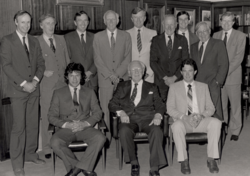
As a bowler, Khan learned a special technique called reverse swing. He later taught this skill to other famous bowlers like Wasim Akram and Waqar Younis. He was known for taking many wickets, especially between 1980 and 1988. In 1982, he took the most Test wickets that year.
Becoming Captain
In 1982, Imran Khan became the captain of the Pakistan national cricket team. Under his leadership, Pakistan won a Test match in England for the first time in 28 years. In 1983, he was recognized as a Wisden Cricketer of the Year.
He also helped change cricket rules to have neutral umpires. This meant umpires from countries not involved in the match would make decisions. This change helped make games fairer.
In 1987, Khan led Pakistan to win its first Test series in India. They also won their first series in England that same year. He briefly retired after the 1987 Cricket World Cup but returned as captain when asked by General Zia-ul-Haq.
World Cup Victory
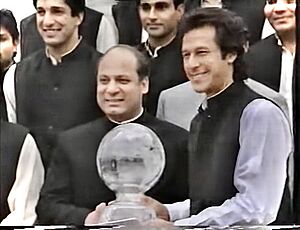
Imran Khan led Pakistan to its greatest cricket victory in the 1992 Cricket World Cup. In the final match, he scored 72 runs, which was the highest for his team. Pakistan won the World Cup for the first time ever.
After the victory, he famously said, "It was rock-bottom when we lost to South Africa. I told the boys they had to play as if they were cornered tigers. I told them to forget about bowling no-balls and wides, and just go out there and fight."
Cricket Records and Achievements
Khan played his last Test match in January 1992 and retired after the 1992 World Cup win. He finished his career with 88 Test matches, scoring 3,807 runs and taking 362 wickets. He also played 175 One Day International matches, scoring 3,709 runs and taking 182 wickets.
He is one of only a few players to achieve the "all-rounder's triple." This means he scored 3,000 runs and took 300 wickets in Test cricket. He also won the most "Player of the Series" awards for Pakistan in Test cricket.
Helping Others: Philanthropy
After his cricket career, Imran Khan became a dedicated philanthropist. He served as a UNICEF Special Representative for Sports. In this role, he promoted health and immunisation programs in several countries.
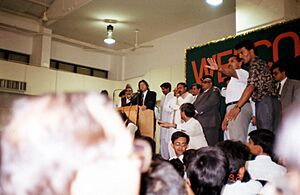
In 1994, he founded the Shaukat Khanum Memorial Cancer Hospital and Research Centre. He named it after his mother, who passed away from cancer. He traveled across the country to raise money for the hospital. His goal was to provide free treatment to patients who could not afford it. As of 2024, about 70% of patients receive free care.
In December 2005, Khan helped establish Namal College in Mianwali. This college aimed to provide technical and vocational education to help people find jobs. The college opened its doors in 2008.
In February 2006, he started The Imran Khan Foundation (IKF). This foundation has supported various relief projects. For example, in 2013, it launched a project to help families displaced from North Waziristan by providing food and other essentials.
Entering Politics
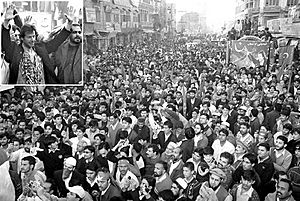
Imran Khan was offered a political role in 1987 by President Zia-ul-Haq, but he declined. In 1993, he briefly served as a tourism ambassador.
Founding a Party
On 25 April 1996, he founded his own political party, the Pakistan Tehreek-e-Insaf (PTI). He ran for the National Assembly in the 1997 elections but did not win.
He supported General Musharraf's government in 1999, hoping it would fight corruption. He won a seat in the National Assembly for the first time in the 2002 election.
In 2007, he resigned from Parliament to protest the presidential election. He was briefly placed under house arrest but later escaped to join a student protest. He was arrested during the protest and spent a week in jail before being released.
In 2011, he held large rallies in Lahore and Karachi, gathering many supporters. He spoke out against government policies and called for change.
2013 Elections and Opposition
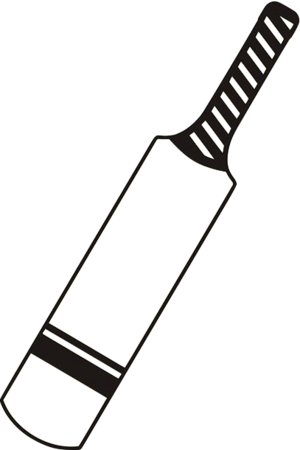
In April 2013, Khan launched his election campaign. He promised to remove Pakistan from the US-led war on terror and bring peace to tribal areas. He also aimed to create a fair education system for all children.
During the campaign, he suffered injuries from a fall but continued to address rallies from his hospital bed. In the 2013 Pakistani general election, his party became the leading party in the Provincial Assembly of Khyber Pakhtunkhwa.
As an opposition leader, he met with U.S. Secretary of State John Kerry in August 2013. He also led protests in 2014, demanding the Prime Minister's resignation and an investigation into election fraud.
Becoming Prime Minister
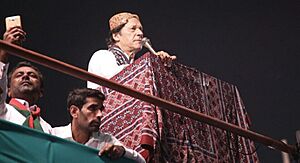
Imran Khan ran in the 2018 Pakistani general election from five different areas and won all of them. This was a first in Pakistan's election history.
On 6 August 2018, his party nominated him for Prime Minister. He was sworn in as the 22nd Prime Minister of Pakistan on 18 August 2018.
Important Work as Prime Minister
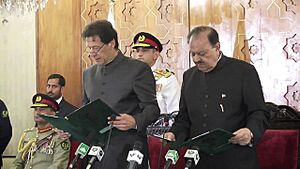
As Prime Minister, Imran Khan focused on several key areas for Pakistan's development.
Helping the Economy
When he took office, Khan reduced government spending. He cut the Prime Minister's staff and auctioned off luxury vehicles. His government aimed to improve the country's financial situation.
Official records showed that expenses for the Prime Minister's office decreased significantly during his term. He also made fewer foreign trips than his predecessors, saving money.
Protecting the Environment
In September 2018, Khan launched the Plant for Pakistan program. This initiative aimed to plant many trees across the country to combat climate change.
His government also announced the creation of 15 new national parks under the Protected Areas Initiative. In 2020, he declared that Pakistan would stop two coal projects and aim for 60% renewable energy by 2030.
Social Programs
Khan's government launched the Ehsaas Programme, Pakistan's largest welfare program. This program provided financial help to millions of low-income citizens.
In November 2019, he opened the Kartarpur Corridor. This allowed Indian Sikh pilgrims to visit a holy site in Pakistan without needing a visa.
Working with Other Countries
Khan worked to improve Pakistan's relationships with other countries. He responded to comments from US President Donald Trump about aid, highlighting Pakistan's sacrifices in fighting terrorism.
After an attack in Indian-held Kashmir in 2019, he stated Pakistan's commitment to peace. He also supported the Afghan peace process and helped facilitate trade with Afghanistan.
In February 2022, Khan visited Moscow to discuss economic and energy cooperation with Russian President Vladimir Putin. He emphasized Pakistan's desire to maintain neutrality in global alliances.
Stance on Islamophobia
Khan spoke out against Islamophobia, which is prejudice against Islam or Muslims. In 2019, he announced plans for a TV channel to address this issue. He urged global leaders to understand why insults against religious figures are hurtful. In March 2022, Pakistan led a UN resolution to make March 15 the International Day to Combat Islamophobia.
After Being Prime Minister
In April 2022, Imran Khan was removed from office through a no-confidence motion. This made him the first Pakistani Prime Minister to be removed this way. He stated that his removal was due to foreign interference.
In November 2022, Khan was injured during a protest march. He received medical treatment and continued his political activities.
Since his time as Prime Minister, he has faced many legal challenges and has been held in detention. He has stated that these legal issues are politically motivated.
In December 2023, he nominated Gohar Ali Khan to take over as chairman of his party, PTI. His nomination papers for the 2024 Pakistani general election were rejected. Despite this, many candidates supported by his party won seats in the election.
In August 2024, an application was submitted for Khan to run in the 2024 University of Oxford Chancellor election. However, university officials disqualified him in October 2024, citing his prior legal situation and active political role.
Wealth and Assets
Imran Khan has declared his assets to the Election Commission of Pakistan (ECP) over the years. These include his homes in Zaman Park, Lahore and Bani Gala, agricultural land, and bank accounts. He has also reported his tax payments annually.
Political Positions
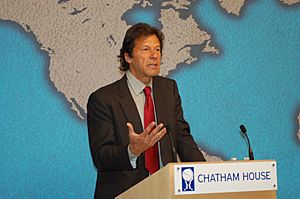
Imran Khan has often spoken about global issues. In 1999, he criticized the UN for not stopping conflicts. He also protested against the 2003 invasion of Iraq, saying it would lead to more wars.
He describes himself as a pacifist, meaning he is against war. He has opposed military actions, especially in Afghanistan, and criticized Pakistan's involvement in the US-led "war on terror." He has also spoken against the Iraq War and the Russian Invasion of Ukraine.
In 2013, Khan suggested secret talks between India and Pakistan to solve the Kashmir issue. He also condemned "forced conversions" of people from different faiths.
Awards and Honours
Imran Khan has received many awards and honors throughout his career. These include:
- Hilal-i-Imtiaz
- Pride of Performance
- Wisden Cricketers of the Year
- Induction into the ICC Cricket Hall of Fame
Authorship
Imran Khan has also written several books and articles. In the late 1980s, he was the editor of The Cricketer magazine. He has written opinion pieces for publications like Outlook, The Guardian, and the BBC.
His 2011 autobiography, Pakistan: A Personal History, shares his journey from cricket to politics and his charity work. In 2021, he wrote an article for CNN about protecting natural environments.
Khan's publications include:
- West and East (1975)
- Imran: The Autobiography of Imran Khan (1983)
- Imran Khan's Cricket Skills (1989)
- Indus Journey: A Personal View of Pakistan (1991)
- All Round View (1992)
- Warrior Race: A Journey Through the Land of the Tribal Pathans (1993)
- Pakistan: A Personal History (2011)
- Main Aur Mera Pakistan (2014)
Images for kids
See also
 In Spanish: Imran Khan para niños
In Spanish: Imran Khan para niños
 | Shirley Ann Jackson |
 | Garett Morgan |
 | J. Ernest Wilkins Jr. |
 | Elijah McCoy |


